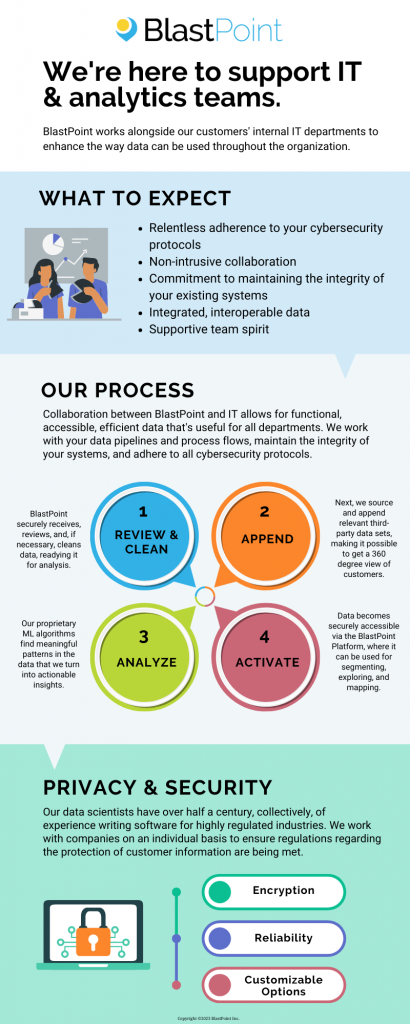Data and analytics have become crucial aspects of modern business, with companies leveraging customer information to enhance customer experience and drive revenue. However, with growing concerns around data privacy, companies need to find balance between utilizing customer data and protecting their privacy. In this article, we delve into the topic with BlastPoint’s VP of Engineering, Tony Cebzanov, who shares insights into how companies can use their customer data to enhance customer experiences safely.
When it comes to data privacy, customers typically share three main concerns. Firstly, they want their data to be protected and not leaked to unauthorized parties. Secondly, they want companies to gather only the necessary data and not go overboard with invasive data collection practices. And finally, if companies want to personalize their services using customer data, they should do so in a way that primarily benefits the customer.
Essentially, customers want to feel like their data is safe, respected, and used responsibly.
To learn more about safeguarding customer data, we spoke with BlastPoint’s VP of Engineering, Tony Cebzanov, who said, “when personalization is done right, it’s clear that the company is using the right amount of data, for a good, pro-customer purpose, that makes sense to them.”
In this article, we’ll discuss how to navigate the complex landscape of data privacy and best practices for creating a trustworthy, personalized customer experience. And, we’ll hear more from BlastPoint’s information security experts about steps companies can take to protect their customer data, including the measures BlastPoint takes in protecting our partners’ data.
Aggregating Internal Customer Data

One of the primary concerns that customers have regarding data is its use. Customers want to be sure that their personal information is being used responsibly and for a purpose that benefits them. This is where companies can use data in the aggregate to protect customers’ privacy while still gaining insights into their behavior and preferences.
By combining data into groups or categories, aggregate data can reveal patterns, trends, or insights that may not be apparent when examining individual records. When customers are segmented even further, businesses can reach and engage customers with services, features, and products that are specifically tailored to their preferences.
For example, a utility company might collect and analyze aggregate data to determine which neighborhoods are most in need of energy-efficient upgrades, such as smart thermostats or appliances. This information can be used to prioritize investments in these neighborhoods to help reduce energy consumption and costs for both the utility and its customers.
Using BlastPoint’s aggregate data together with our propensity tool, business teams can predict which customers are most likely to adopt these products first. From there, marketing teams can save time by aggregating channel preference data into their customer segments ahead of a campaign launch, based on the information they already have, such as which customers should receive emails and which should see ads in their social feeds or via text message.
By looking at patterns across groups of customers, rather than individuals, companies can customize their offerings and improve their services without compromising individuals’ privacy.
Simply having that data doesn’t just bring about customer intelligence. It takes strategic planning to decide what to actually do with it. Learn how to build a purposeful framework and implement insights from your data here.

Buying Customer Data From Third-Party Vendors
Another concern for customers is the legality of using data brought into an organization from a third-party data provider. Data broker companies – of which there are thousands – gather publicly available – yes, and private too – information on consumers and make those lists available to companies for purchase. The benefit of buying this data is that it helps fill in gaps where internal data isn’t enough alone for teams to personalize campaigns to customers.
Personally-specific Data.
Contact information, demographics, occupation, and more – help build complete customer profiles so teams can identify and target specific groups of customers for marketing campaigns and personalize their customer experience.
As a buyer, it’s important to ensure the vendor has obtained permission to use that data from the customers themselves. In other words, vendors should be able to provide evidence that the customers whose data they are selling have consented to that data being shared with other companies. Note: Responsible vendors should be accustomed to providing this information.
Inferred and Modeled Data
Inferred data can be used to personalize product recommendations, create targeted advertisements, or similar marketing outreach campaigns. Similarly, modeled data can predict, for example, which customers are most likely to churn, or which ones are most likely to respond positively to a particular marketing campaign.
When asked about modeled data, our information security team warns that it’s important to make it clear to users which fields are modeled so that they aren’t misled into believing that modeled data is “ground-truth fact” about their customers.
Why? Because models can only be as accurate as the data they are based on, and there may be biases or inaccuracies in the data that can affect the accuracy of the models. As your customer’s behavior or outcome being predicted may change over time or in response to new factors, data can quickly become outdated or inaccurate. Therefore, it’s important for companies to regularly reassess and update their models based on new data and changing circumstances to ensure their accuracy.
Teams should execute smart legal reviews and examine how much reliability is applied to third-party data for their campaigns and customer experience decisions. Furthermore, due diligence is important in case complaints about the use of customers’ data arise.
Buying third-party data and integrating it with the data you already have better equips your company to serve people with the kinds of products and services they want. And you can offer those precisely when they want them; using the kinds of messaging that will resonate most, through channels that are most likely to yield high engagement. Learn more: Customer Intelligence for CX Teams.

Sharing Customer Data with Vendor Partners
It’s not uncommon for businesses to give vendors access to their customers’ data. For instance, email-delivery systems or marketing communications hubs, like HubSpot or Mailchimp, require access to customer data to perform their designated functions.
However, it’s important to limit the scope of what is sent to only include what is necessary for the specific task. This is particularly important for personally identifiable information (PII), which is highly valuable to hackers or resellers.
Companies should also review vendors’ data security practices to ensure that they are as diligent with the data as they would be with their own. While transferring data for a business purpose is allowed under regulations like GDPR, companies must ensure they have the right contractual assurances from vendors to protect against any potential breaches. In the event of a breach, the company that owns the data will still be liable under certain conditions. This is why it’s important to review and limit the scope of what data is sent to vendors and to ensure that vendors have appropriate data security measures in place.
Building relationships with energy utility customers beyond transactional messaging can be a challenge. Data and personalization can help build more effective marketing messages, higher engagement rates, and increased program conversions, to name a few. Listen in on BlastPoint’s conversation with Questline Digital where we discuss how personalization can enhance the customer experience here.
How BlastPoint Protects Our Partners’ Data

At BlastPoint, we understand the importance of protecting customer data – even in the most highly regulated industries. Our team of experienced data scientists and engineers has a collective experience of over half a century in writing software for such industries. We work with each company on an individual basis to ensure that their customer data is secure and complies with the necessary regulations.
We take the security of customer data seriously, and we use advanced encryption techniques to protect data in motion and at rest. In addition, we segment data in the cloud by customer and provide role-based authorization only to those who need to access it, limiting visibility of PII fields.
We also recognize the need for companies to respond to changing regulations, which is why we offer a customizable and auditable platform that can adapt to changing regulations quickly. Our technology allows companies to adjust their customer intelligence processes while maintaining compliance with regulations.
At BlastPoint, we strive to provide our clients with a personalized experience while ensuring that their data remains secure. Check out our solutions by industry and case studies to learn more about our results-driven intelligence, or contact us and schedule a demo with one of our Experts today!

